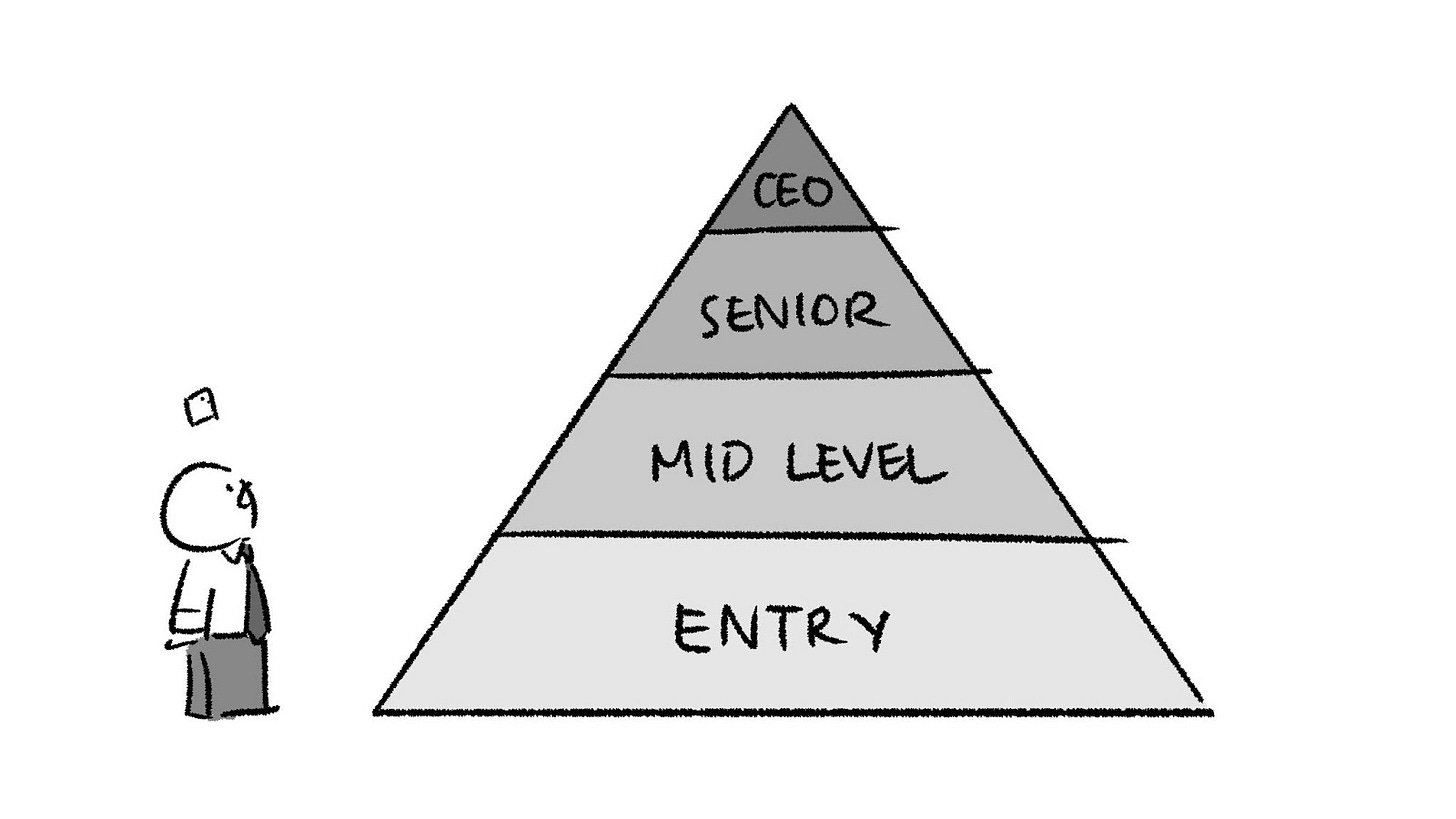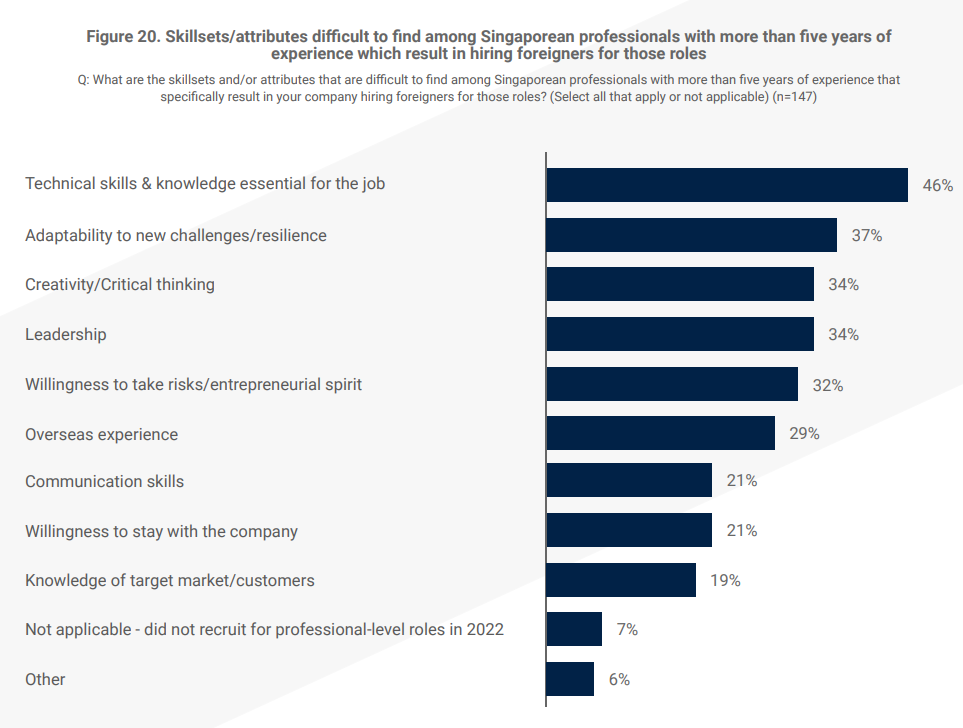Why some capable Singaporeans don’t make it to senior positions
It’s not as straightforward as “fOrEiGnErs aRe tAkiNg aLL oUr jOBs”
Here’s a gripe I’ve heard a couple of times before from my Grab driver(s).
It goes along these lines:
“All these big companies need to start hiring locally for senior roles.
But instead of tapping on local Singaporeans, they use foreigners instead.
It used to be angmohs — Americans, Europeans and Aussies. But now there are also Indian and Chinese nationals who are 'stealing' these big positions.”
Does he have a point? Well, somewhat.
While in recent years many Singaporeans in senior positions have become more visible — think Chew Shou Zi, TikTok’s CEO, or Jessica Tan, Ping An Insurance’s executive director — there’s still a lack of Singaporeans in senior positions.
According to a 2023 study by the American Chamber Of Commerce (AmCham), only about one-third of companies in Singapore have more Singaporeans than foreigners in senior positions.
So yes, some Singaporeans are making it to the senior levels of the corporate ladder. But what about the rest? We spoke to some HR professionals to test out our theories.
Tough truth #1: We lack overseas exposure
Many MNCs are in Singapore, but they’re not here only for Singaporean customers.
Rather, they want a place where it's easier to reach the hundreds of millions of potential customers in Southeast Asia. This is also increasingly true for Singaporean SMEs.
This means they need people who can help them navigate these countries well. This might be having a good understanding of local customs, language, legal frameworks, business practices and having strong networks there.
Often — but not always — this cannot be acquired just by staying in Singapore.
Unfortunately, that’s what many of us tend to do. For all the complaints we have about Singapore, we’re often reluctant to leave the safety, convenience and familiarity of Singapore to seek opportunities beyond.
But here’s the thing: a multinational company often requires a multinational, and multicultural workforce.
One HR source at a FMCG multinational said while it was possible to make Director without having worked overseas via Cultural Intelligence training (to manage regional personnel), these personnel didn’t make it to Vice President.
Tough truth #2: We’re picky about overseas opportunities
Even when the opportunity to work overseas does present itself; Singaporeans tend to be ultra-selective, or some will say, picky. (Kinda like how we pick our BTOs.)
We tend to gravitate towards developed countries like Australia, US, Japan, Europe or the UK. While there’s absolutely nothing wrong with this, these are often competitive roles where Singaporeans don’t have an edge in.
Ironically, it is the very countries that Singaporeans shun that are where we have an advantage. This is true for Southeast Asia, where people are generally less proficient in English, and have trouble communicating with the global market.
One observation made by all our interviewees is that Singaporeans also tend to ‘wait’ to be posted overseas by their existing jobs. This is opposed to, say, actively looking for jobs outside of Singapore.
Tough truth #3: Singaporeans don’t utilise their networks
Here’s a common complaint we hear often: Once a foreigner in a senior position gets the job at a MNC, they tend to start hiring their own nationalities. Over time, the entire team becomes foreigners.
Singaporeans? We don’t do things like that.
Instead, we tend to believe that people should be hired and promoted based on merit, hard skills and experience. Hence, the de facto way to move up the corporate ladder is as follows:
Keep your head down
Be humble
Work hard
Have excellent hard skills
Hope to get noticed, or apply for your next job through a portal
In some strange way, Singapore’s commitment to meritocracy actually hurts us, especially in a global workplace where everyone utilises their personal networks to get a job.
Further reading:
Tough truth #4: There are simply not enough senior positions
Many Singaporeans have a rigid idea of what success looks like to them. A senior, high-paying position in a big company.
But here’s the thing.
There are about 7,000 multinational companies located in Singapore. This sounds a lot, but we also have 2.3 million citizens in the workforce.
Assuming (generously) there are 30 senior positions in each MNC, that means there are ~210,000 senior positions — in reality, there are probably less.
Subtracting the number of self-employed people (about 12.2% of the workforce), that’s still 2 million people competing for the same desired positions in one city. Not all of us will get what we want.
For many people, waiting in a long line in an MNC is the far more attractive option as compared to…
Working in a SME (because of notions of bad culture and low pay)
Becoming self-employed or starting own business (cos risky)
Leaving Singapore to work overseas (see above)
Further reading:
Tough truth #5: Our skills are just not good enough
Source: AmCham Singapore 2023 Manpower Survey Results
According to the same AmChan survey, a lack of ‘Technical skills & knowledge essential for the job’ is a top reason why foreigners get hired over Singaporeans. ‘Adaptability & resilience’ and ‘Creativity’ (or a lack thereof) were second and third respectively.
The classic reaction to this is to blame our education system: “We have so many universities, but we are not producing talent. The education system must be broken!!!”
Well… if this survey was about fresh graduates not being able to find jobs, then that argument would be true.
But the roles Singaporeans struggle to fill aren’t ‘entry-level’ roles. They are for roles that require more than five years of experience.
This means it has less to do with what we’ve learnt in university, but more of what we’ve done with our careers after — more specifically, in those 5–10 years after university.
One HR professional we spoke to remarked that Singaporeans think they’re all that, but in reality, we are not as good as we imagine:
“When it comes to software development, there are many Vietnamese, Indians and Indonesians that are more proficient. If you want to have someone face clients sometimes Singaporeans are just not vocal and outspoken enough.
Once you take into account the higher salaries Singaporeans want to be paid, then it often just doesn’t make sense.”
Tough truth #6: Maybe we are just not ambitious in the workplace
Last but not least, we acknowledge that there’s a segment of Singaporeans out there who simply don’t want to dedicate their lives to climbing the corporate ladder.
Many Singaporeans prefer to become middle managers, while striking the perfect balance between work-life balance, job stability, and salary. They want time for their hobbies and loved ones.
If you ask us, that’s a respectable, worthy and valid choice.
After all, the workplace isn’t the only place to be ambitious. You can strive to be a good child to your aged parents. You can strive to be a good father or mother. Or even an important member of your community.
That said, all choices have trade-offs. People who climb the corporate ladder often sacrifice work-life balance, health, sleep, and relationships in the pursuit of success.
Those who choose not to climb?
They will often earn less than the high earners around them.
Further reading:
A parting word
Singapore is a city trying to attract the world’s best talent; that’s a lot of people you’d likely be paid less than. And keep in mind that if middle managers overseas get good enough, they will become your direct competition and further depress the wages.
Can the average Singaporean accept that?
Given how our society is wired to pursue a narrow definition of success — both personally and professionally — we’re not so sure.
But what we do know for sure is this: If you indeed want a better life year after year, then you’ll need to find ways to deliver value. More than what AI is delivering. More than what our Southeast Asian neighbours are delivering.
This means Singaporeans need to learn to work with our upskilled foreign labour, not directly compete with them. But that means we ourselves need to upgrade our skills even further.
That’s tough, but the decades old adage is true: no one owes Singapore a living.
And well, the rest of the world doesn’t owe Singaporeans a senior position too.
Stay woke, salaryman.
Further reading:
If you’ve read this far, please consider subscribing to our email newsletter (yes, this Substack). We cannot offer you much but we can offer this:
We have newsletter-exclusive articles that won’t be posted anywhere else. We created these articles for people who want to go deeper into complex issues than the shorter-form content we typically have.
If you don’t have social media or don’t follow our Telegram channel, you can still get updates to all our content emailed directly to your inbox to read at your own time.
We promise not to spam your inbox (but Substack might, so update your notification settings).














As someone who got posted overseas for work, I feel that I see so much further after being sent out of SG.
It isn't easy to learn a new language and get used to different cultures, but all of these eventually adds to the list of tools we have in our box to solve future challenges.
I have worked in a MNC for several years. Frankly speaking I have seen many capable Singaporean executives. Conversely I have seen my fair share of incomptent foreign executives but they have one skill that helps them survive. They are good at profiling themselves and sounding good. Our guys need to master that skill.